- Home
- Neal Stephenson
The Mongoliad: Book Three tfs-3 Page 3
The Mongoliad: Book Three tfs-3 Read online
Page 3
Haakon watched as another wave of fire arrows took flight. They rose and fell, spreading themselves throughout an area closer to the cages. One thwacked into the ground not far from him, and Haakon stared at the burning strip of cloth wrapped around the shaft of the arrow.
Krasniy, the red-haired giant who was squeezed into his own cage nearby, hissed at Haakon. When he saw that he had the young man’s attention, the giant hunched his back, finding a better position within the confinement of his prison, and jerked a thumb at the roof of his cage. He strained, muscles standing out in his thick neck, as he tried to snap the heavy cords that bound the roof to the bars. Haakon watched Krasniy for a moment, and then returned his attention to the fires and chaos around them. No one seemed to be paying much attention; for the moment, the giant could try to escape.
Krasniy let out a huge rush of air, a noisy exhalation that bordered on a cry of frustration and despair. Haakon didn’t have to look to know what the sound meant. The cage was stronger than it looked. Or the giant was weaker than he had thought. The cords held.
Haakon wedged his shoulder against the bars of his cage, and stretched his arm as far as he could manage. The arrow was just out of reach, and the flames licked at the tips of his fingers. Another inch or so. That was all he needed. He pressed his feet against the floor of the cage, trying to gain a little more leverage, trying to squeeze a little more of his arm through the bars. The flames danced merrily, capering in delight at his efforts. He opened his hand wider, ignoring the searing pain that followed, and wrapped several fingers around the arrow. With a gasp, he shoved himself away from the bars, closing his hand into a fist.
He rolled over, twisting his wrist so that the arrow fit through the bars. He threw it to the floor of his cage and beat at it rapidly with both hands. Slapping hard to put out the flame, to not feel the pain as the fire fought back.
The orange flames flickered and vanished, leaving only a thin strand of white smoke and a stinging pain in his palms. Gingerly, he picked up the arrow. The fire had devoured the cloth that had been wrapped around the shaft, and the shaft itself was charred enough that he thought it would break if he flexed it at all. But that wasn’t what he was interested in.
It was a heavy war arrow, and the metal arrowhead was hot to the touch. Its edge was still sharp.
He snapped the head and a few inches of wood off the charred shaft, and shifted around in his cage until he was closer to Krasniy’s cage. The giant was watching him, and when Haakon tossed the arrowhead over to his cage, he grinned at the young Northerner.
Just as Krasniy was twisting himself in his cage to get at the ropes, a group of Mongol warriors sprinted out of the line of ger. Krasniy froze, but the men were not interested in what the prisoners were doing. As quickly as they appeared, they were gone, and both of the prisoners relaxed. Krasniy stared at the piece of arrow in his hands-it appeared almost like a child’s toy in his thick fingers-and then he shook his head.
Haakon nodded. When the attack had first started, the confusion had seemed like a perfect opportunity for them to try to escape, but the chaos also meant guards could wander by at any time. It would take time to saw through the ropes, and without knowing they would be undisturbed, it would be a risk. As frustrating as it was, it was better to wait.
Cradling his hand in his lap, Haakon arranged himself as comfortably as he could in his cage. In the weeks he had had to watch his captors, there had been almost no opportunities to see them in combat. He had learned a great deal by watching how they rode their horses, how they organized their patrols, and the type of armor and weapons they carried, but he hadn’t actually seen them fight.
The flights of flaming arrows had stopped, and Haakon suspected this meant the attackers were launching their ground offensive. The rain of fire was meant to disorient and confuse the Khagan’s men, a tactic that would reduce their effectiveness. Perhaps this meant the attackers did not have so many numbers that they were going to overwhelm the camp. While it was likely that most of the fighting would happen near the perimeter of the camp, Haakon sat near the bars of his cage and watched. He saw men and women running about in a chaotic effort to put out fires, and occasionally he would spot the glint of firelight off steel as armed warriors moved through the ger, intent on finding invaders.
Stories of Feronantus’s insight into battlefield tactics were told and retold among the initiates at Tyrshammar, and here was an opportunity for Haakon to observe-to learn something of his enemy that might be useful knowledge. Yet he could see so very little.
As he strained to get a better glimpse of the fighting, he wondered if there was any leader in the West that could command such willing sacrifice-not just from his soldiers, but from all of his subjects. Soldiers would fight to protect their lord-that was their commission, after all-but civilians, for the most part, suffered whatever rule was impressed upon them. Some kings did manage to instill some devotion in their subjects, and the landed nobility might be inclined to take up arms for their ruler out of a similar devotion, but the wholesale fixation of a people on their leader on the scale that was the Mongol Empire dwarfed any kingdom Haakon had ever heard of in the West. Not even the Pope enjoyed this kind of fervor from his flock.
The Mongolian devotion to their Khagan was… daunting.
But he does have enemies, Haakon thought. He could hear men fighting. He flexed his singed fingers, wishing he had a real weapon.
Munokhoi paid little attention to the wild faces that rushed at him from the gloom. The night was filled with twisting strands of smoke, which disgorged screaming Chinese men at random intervals. Some of them had weapons-swords and spears he brushed aside like seed pods floating on a breeze-and others were wide-mouthed phantoms that he silenced with a quick thrust of his blood-drenched sword. They came and went, and their deaths were but tiny sparks that vanished instantly in the raging fire of his bloodlust.
He wanted the Chinese fire thrower.
He had seen its fiery exhalation a moment ago, a spurt of purple flame that had appeared like a tear in the night. The men fighting near him had been knocked down, and when he raised his right arm, he felt jagged jolts of pain run down his side. Tiny bits of metal hissed and steamed in his armor, and his elbow gleamed with fresh blood. But he didn’t stop. He couldn’t stop. Not now.
He was so close.
There were two of them-Chinese alchemists-hunched together like two whores tittering to one another. One held a tiny covered lantern that let slip tiny shards of firelight; the other was frantically trying to wipe down a long misshapen tube. There were a number of pots and satchels scattered around them, the cumbersome tools of the nefarious device.
With a shout, Munokhoi dashed toward them. The one carrying the lantern looked up, and light from his lantern glinted off Munokhoi’s upraised sword. He brought his arm down, felt the blade bite into flesh, and then he yanked the sword toward him, pulling the Chinese man off balance.
The first alchemist dropped the lantern, and its cover was knocked askew. The other alchemist froze, the whites of his eyes glowing in the dim light.
Munokhoi twisted his blade and pulled it free. The first alchemist made a wet coughing sound, and fell to his knees, vainly trying to stem the steady stream of blood coming from a mortal wound in his neck. Munokhoi kicked him out of the way, and pointed his dripping blade at the second alchemist.
“Show me how it works,” Munokhoi snapped, speaking Chinese.
The alchemist shook his head, trying to pretend he didn’t understand Munokhoi’s words. The tube in his hands looked like a piece of swollen bamboo, though it was made from iron; one end was dark with soot. The alchemist’s hands were stained black as well, and he was missing two fingers from his left hand.
Munokhoi flicked the point of his sword, letting it ring off the tube, and then he flicked it up. The man jerked his head back, but not quickly enough, and the sword point opened up a line on his cheek from which blood immediately started to well.
&nb
sp; “Show me,” Munokhoi said again, all trace of humor gone from his voice.
His body shaking, the Chinese alchemist lowered himself to his knees and started to comply. Munokhoi watched closely as the man loaded the ingredients from the pouches and pots into the mouth of the tube, trying to keep them straight in his mind. A thick plug with a thin tail went first, the tail emerging from the back side of the tube. Then, two handfuls of black powder. Shards of metal went next, and Munokhoi felt the muscles in his side and lower back twitch as he heard them rattle into the dark mouth of the weapon. He knew that when he had his wounds examined later, similar pieces of ragged metal would be found embedded in his armor and skin. Last was another piece of flat metal, almost like a cap, that the Chinese man lowered carefully so that it filled the mouth of the barrel before sliding in.
Munokhoi nodded, his tongue flicking over his dry lips. Yes, he could remember that sequence. Eagerly, he gestured with his empty hand for the Chinese alchemist to give him the loaded weapon, and to his surprise, the man flung the tube directly at his face.
Caught off guard, Munokhoi reared back instead of intercepting the clumsily hurled missile. He found his pulse racing at the thought that the weapon was going to explode in his face, but the tube struck him in the chest-nothing more than an inert, heavy object-and then fell to the ground.
The Chinese alchemist was gone, having taken that split-second opportunity to flee.
Munokhoi stared into the night for a moment, idly rubbing his chest where the weapon had hit him, and then he retrieved the tube from the ground. Peering at it carefully, he decided it was unharmed. The man had distracted him with it long enough to make his own escape, and Munokhoi couldn’t help but chuckle at the man’s well-timed cowardice.
He had been planning on using the weapon on the man anyway.
He examined the string hanging from its back, and determined that it was a fuse. He retrieved the discarded lantern, checked on the tiny stub of a candle that provided its illumination, and looked about for a suitable target.
The first alchemist was still alive. He was hunched over on his knees, choking and struggling to staunch the flow of blood from his neck. Munokhoi held the candle up to the end of the fuse until the tiny string caught fire. Sparking and hissing, the fuse crinkled, rolling itself up into the back of the tube.
Munokhoi pointed the tube at the choking man, and whistled lightly, catching his attention. The alchemist looked up, startled by the noise, and his eyes focused on the mouth of the tube. He dropped his hands from his bloody throat, and started to curse Munokhoi. One of those long Chinese curses that went on forever.
Fortunately, the man’s last breath was cut short by the detonation of the weapon. It jerked in Munokhoi’s hands, belching a tongue of blue flame with a mighty roar, and the alchemist was smashed against the ground as if he had been swatted by the hand of a giant. The air was filled with the reeking stench of the fire powder, and the tube was so hot in his hands that he almost dropped it.
The alchemist’s body looked as if it had been set upon by wolves, hungry beasts that had stolen its head and part of an arm, shredding the rest to a mess of bloody strips.
Cackling with delight, Munokhoi set the tube down on the ground and began to investigate the pots and leather bags.
CHAPTER FOUR
The Orphan’s Tale
Ocyrhoe thought the watchful eyes of the Holy Roman Empire would be closer to the walls of Rome. As they trudged away from the city, she tried to explain to Ferenc what she expected to find. Those leaving Rome would move freely, most likely, and it would only be city-bound travelers who would attract attention. The soldiers of the Holy Roman Empire had been charged with detaining men of the cloth-ecclesiastical officials, presumably Cardinals-who were traveling to Rome in order to participate in the Papal conclave. After a lengthy session of Rankalba she thought he understood the what of the empire’s obstruction, though she was not sure he understood the why.
In her imagination, the road would be blocked by a gate, much like the gates in the Aurelian Wall, and soldiers of the empire would be checking all pilgrims bound for Rome, seeking some sign or symbol of their Papal importance. Such was the imagination of a city-bound child; she realized her ignorance as soon as they were outside the city, for the roads were lightly traveled and surrounded by open countryside.
She understood Ferenc’s confusion as she realized the approach to Rome was not as well guarded as she had anticipated. Ferenc had tried to tell her something about how the priest’s vision had protected them on their approach to the city, but he wasn’t fluent enough with Rankalba-the secret language of knots and finger touching-to express himself plainly. And was such protection even necessary? she wondered.
He was frustrated with their lack of a truly common language, as was she, and she tried to reassure him. I will teach you more, she told him. He had shrugged-When? — and since she had no answer, they let their hands drop. They walked in silence, and her fingers ached to reach out and try to soothe him.
It took them until the early afternoon to find men who wore the colors of the Holy Roman Empire. A brace of them stood at either side of the road, watching for Rome-bound traffic, and they were able to get within shouting distance before the men noticed their approach. Ocyrhoe squeezed Ferenc’s arm one last time, and then presented herself to the ruddy-faced, pale-haired soldier who seemed to be in charge of the group. She put her curled fist over her heart and bowed, wishing she knew the precise ritual address for seeking audience. Cardinal Somercotes had known more about Binder etiquette than she did…
The soldier’s disdainful expression softened when she began to speak in slow, clear Italian. “I am bound with a message to the Emperor,” she began. “Robert of Somercotes, Cardinal of the Church, sends greetings and words.” Beyond that, she had no idea what to do next.
Neither did the soldier. He blinked at her a few times. “Do you want money?” he finally asked. His accent was thick, and Ocyrhoe thought for a moment that he was speaking Latin, but then she understood the emphasis he was putting on his vowels and realized he was speaking a dialect so estranged from her Roman Italian that it was almost a different language.
Despite her best effort, she could not hide her righteous indignation at being mistaken for a wandering orphan, and her expression was so intense that the ruddy-faced soldier jerked back in surprise.
“I do not want money,” she retorted. “I am bound with a message to the Emperor. A Cardinal has sent me. I must speak with your officer. Now.”
The other men clustered around them, and the ruddy-faced soldier, not quite sure what to do with this strange and intense girl, glanced back and forth between Ocyrhoe and Ferenc. Ferenc stared back at him for a moment, then smiled wanly. Ocyrhoe checked the urge to stamp on his foot; he was not helping her credibility.
Resolute in her need, she remained standing in front of the soldier, staring at him, until he turned to one of the other soldiers and sent him running to fetch someone who would know what to do. Ocyrhoe knew she did not have exactly the right salute, or exactly the right greeting, but she was sure the words bound and message-especially in conjunction with the words Emperor and Cardinal-would catch someone’s attention.
It was a hot, sticky afternoon, and she and Ferenc wandered over to the shade of a nearby tree. Several of the other soldiers were amused by her indifference to them, and they took it upon themselves to join her and Ferenc in the shade. They remained standing, while she and Ferenc sat, maintaining the illusion that the pair were under guard.
Ocyrhoe didn’t much care what they thought, as long as they left her alone. She found a comfortable crook in the roots of the tree. Someone would come from the soldiers’ camp soon enough. And as Ferenc and the soldiers watched over her, she fell into a light slumber. What else could she do at this point?
The sun had softened, and the shade of the tree was much longer when she woke. There were more people gathered around the tree-additional soldiers and
a young man no older than Ferenc who, in much better Italian, asked them to follow him. Accompanied by a group of soldiers, she and Ferenc let themselves be led across the sparse countryside to a covert village of canvas tents that were hidden behind a narrow wood of dense trees.
A full-fledged Binder would not stare. A full-fledged Binder would not even appear to be interested in what was around her, Ocyrhoe told herself, so focused would she be on completing her task. But the tent village of the Holy Roman Empire was the strangest environment she had ever seen.
She saw almost no women; most of the men and boys were coiffed, shod, and dressed alike; and although the village appeared to be a mobile community-with livestock, ovens, latrines, even a chapel-the sounds and sights were all wrong: there were no cries of street peddlers, no shouting children, no banners advertising wares, no open stalls of a marketplace. It was a stolid, unfriendly place.
But she did not ogle. And neither, she was pleased to see, did Ferenc. The moment they’d gotten out of the city, he had relaxed in a way she had not seen before, and even now, he seemed far more at home than she felt.
The two youths to whom they had been entrusted-one before them, one behind-marched them between two rows of low-slung sleeping tents, and then turned left directly into a much larger, higher tent. Ocyrhoe squinted in the diminished light.
Despite the heat, the walls of the tent were pegged down, preventing any breeze from cooling the stuffy air within. There were three-legged stools scattered at one end of the enclosed space, around a low table with an unlit lamp on it. The soldier behind them tied back the tent flap, which let in sunlight but very little air. He saluted his fellow soldier and then departed.

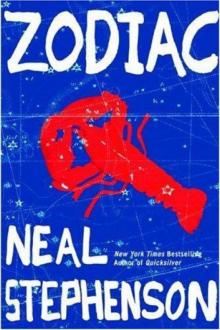 Zodiac: The Eco-Thriller
Zodiac: The Eco-Thriller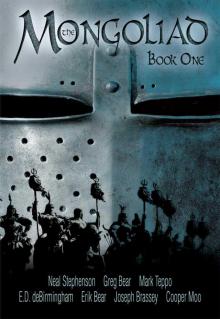 The Mongoliad: Book One
The Mongoliad: Book One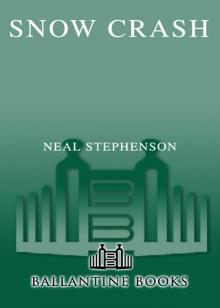 Snow Crash
Snow Crash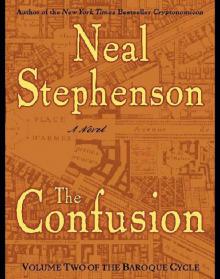 The Confusion: Volume Two of the Baroque Cycle
The Confusion: Volume Two of the Baroque Cycle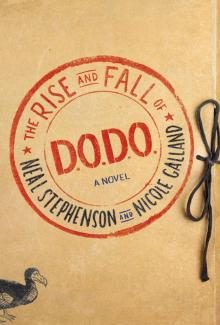 The Rise and Fall of D.O.D.O.
The Rise and Fall of D.O.D.O.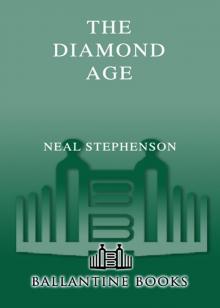 The Diamond Age: Or, a Young Lady's Illustrated Primer
The Diamond Age: Or, a Young Lady's Illustrated Primer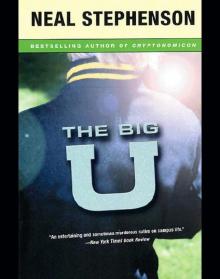 The Big U
The Big U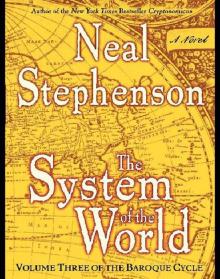 The System of the World: Volume Three of the Baroque Cycle
The System of the World: Volume Three of the Baroque Cycle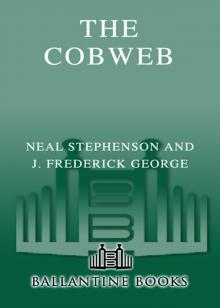 The Cobweb
The Cobweb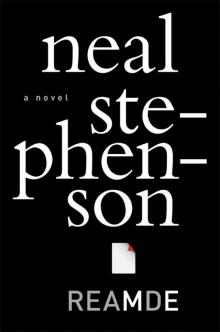 Reamde
Reamde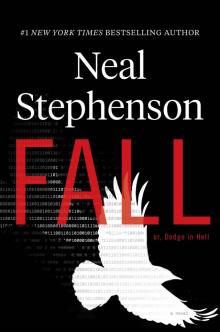 Fall; or, Dodge in Hell
Fall; or, Dodge in Hell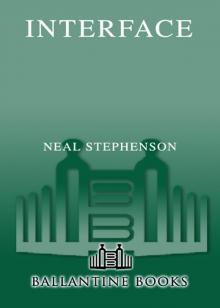 Interface
Interface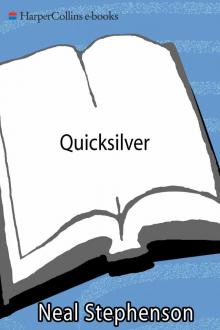 Quicksilver
Quicksilver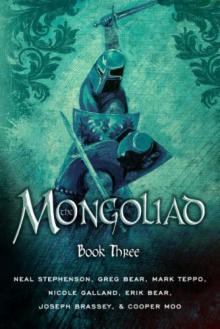 The Mongoliad: Book Three
The Mongoliad: Book Three Seveneves
Seveneves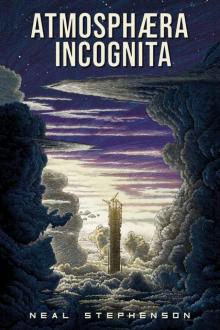 Atmosphæra Incognita
Atmosphæra Incognita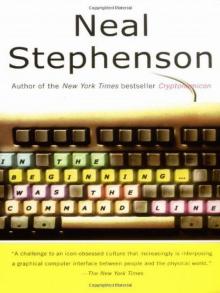 In the Beginning...Was the Command Line
In the Beginning...Was the Command Line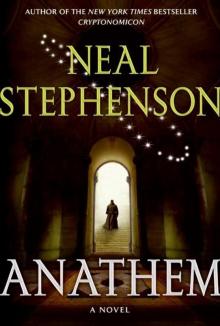 Anathem
Anathem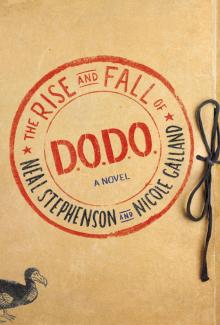 The Rise and Fall of D.O.D.O.: A Novel
The Rise and Fall of D.O.D.O.: A Novel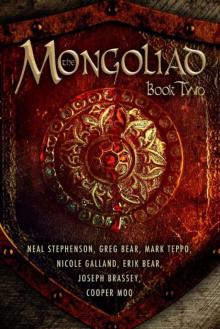 The Mongoliad: Book Two
The Mongoliad: Book Two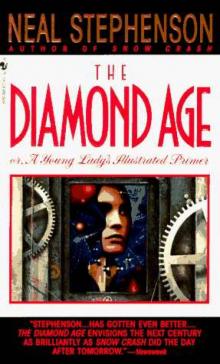 Diamond Age or a Young Lady's Illustrated Primer
Diamond Age or a Young Lady's Illustrated Primer THE System OF THE WORLD
THE System OF THE WORLD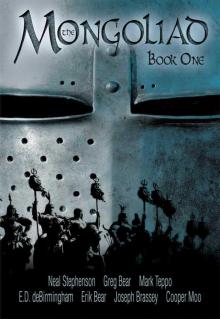 The Mongoliad: Book One tfs-1
The Mongoliad: Book One tfs-1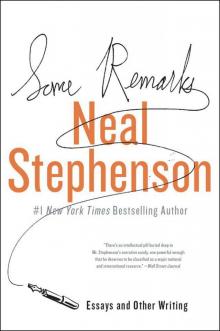 Some Remarks: Essays and Other Writing
Some Remarks: Essays and Other Writing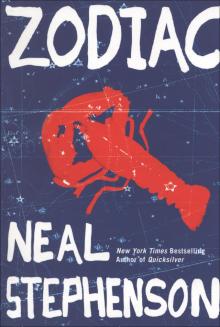 Zodiac
Zodiac Spew
Spew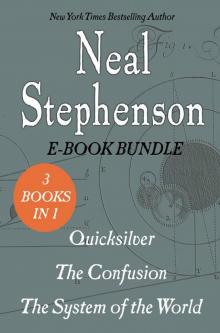 The Baroque Cycle: Quicksilver, the Confusion, and the System of the World
The Baroque Cycle: Quicksilver, the Confusion, and the System of the World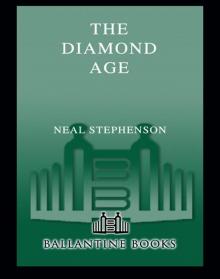 The Diamond Age
The Diamond Age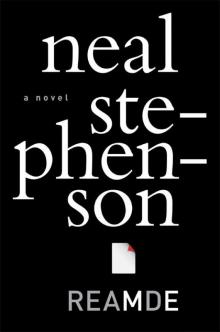 Reamde: A Novel
Reamde: A Novel In the Kingdom of Mao Bell
In the Kingdom of Mao Bell Mother Earth Mother Board
Mother Earth Mother Board Twelve Tomorrows - Visionary stories of the near future inspired by today's technologies
Twelve Tomorrows - Visionary stories of the near future inspired by today's technologies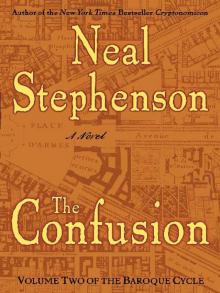 The Confusion
The Confusion The Great Simoleon Caper
The Great Simoleon Caper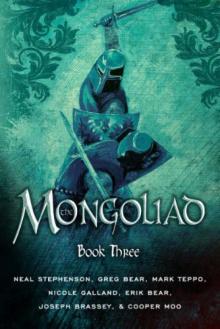 The Mongoliad: Book Three tfs-3
The Mongoliad: Book Three tfs-3